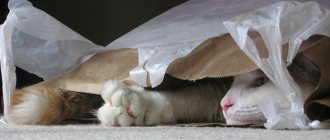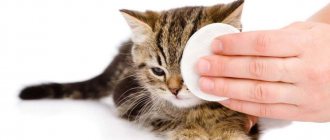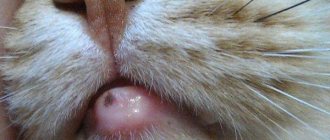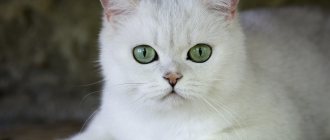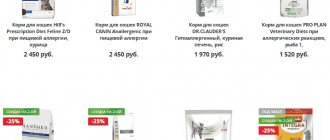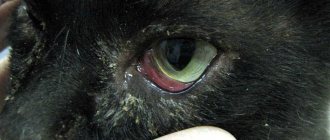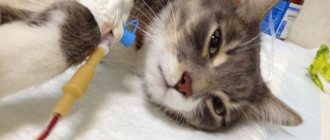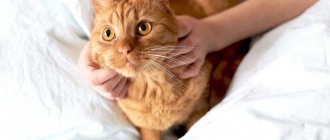What can poison a kitten?
Kittens are curious creatures and show interest in everything. However, even at home, a child faces various dangers. What causes animal poisoning? There are a number of factors that can provoke the development of poisoning.
Causes:
- Food intoxication occurs as a result of consuming low-quality food and harmful waste. Digestive disorders are also possible when overeating. The stomach does not accept large amounts of food, but animals are not able to strictly control the amount of food.
- Poisoning in a kitten can be caused by house plants. What is safe for humans has negative consequences for animals. Some potted flowers disrupt the functioning of the cardiac and respiratory systems, leading to death.
- The curiosity of kittens has more than once become the cause of serious intoxication with household chemicals. Bright bottles attract attention, and for a small cat, one drop of the chemical is dangerous and can kill the animal.
- Inhaling chemical fumes is also dangerous. Antifreeze, fuel, solvents - these substances can disrupt the normal life of a kitten.
- Insect and tick repellents are also dangerous if used incorrectly. Flea drops can be used from a certain age if the dosage is observed. Flea collars should also be selected based on the age of the animal. For small kittens, it is better to comb out fleas yourself or use a gentle flea shampoo.
- Rat poisoning often occurs. Manufacturers make poison with an attractive smell that not only rodents like. Intoxication of a kitten by a poisoned mouse leads to the development of serious consequences, and death cannot be ruled out.
- Medicines also pose dangers. He can lick a bottle of medicine and swallow a pill. Some owners do not comply with the dosage when treating their pet, which also leads to intoxication.
- Another cause of poisoning is eating wild poisonous plants or herbs treated with pesticides.
Poisoning occurs in the absence of proper attention on the part of the owner, since a curious pet tastes everything. Toxins can enter through inhalation, through the skin and mucous membranes.
General information about poisons for exterminating rodents
In order for a veterinarian to prescribe the correct treatment for a pet, he needs to know what kind of poison he was poisoned with. According to experts in chemical deratization, the most popular poisons for rodents are anticoagulants (chronic rodenticides).
By blocking the production of vitamin K, anticoagulants inhibit the synthesis of prothrombin, thereby inhibiting the blood coagulation system. A mouse or rat dies from multiple internal bleeding (in a dead rodent you can see uncoagulated blood in the area of the anus and mouth). Before death, the rodent becomes very weak, which makes it easy prey for the cat.
The first generation of rodenticides (warfarin - a substance synthesized from dicumarol and other indanedione derivatives) was ineffective: upon repeated use, rodents were already immune to them.
Rat or mouse poison of the second generation is represented by such drugs as: difenacoum, coumatetralil, bromadiolone, zinc phosphide, bromethalin, etc. These substances are intended for the effective destruction of rodents that have become resistant to first-generation rodenticides .
Typically, manufacturers of poison for household pests calculate a dosage of the active substance that will not cause the instant death of a pet that accidentally eats it. This leaves the owner time to take the cat to the clinic and immediately administer an antidote.
Symptoms and causes of poisoning
Due to the wide variety of poisons, diagnosing poisoning is difficult.
However, a caring owner will pay attention to changes in the kitten’s behavior. What symptoms and signs are characteristic of poisoning? Signs:
- Refusal to eat;
- Lack of activity, apathy, lethargy;
- Nausea, vomiting;
- Diarrhea;
- Increased salivation.
Poisoning by various substances is characterized by the presence of certain signs. It is recommended to pay attention to them to detect the cause of intoxication.
Medicines:
- Changes in the functioning of the nervous system;
- Drowsiness, lethargy or agitation;
- Large pupils;
- Change in color of mucous membranes;
- Loss of coordination;
- Strong flow of saliva;
You will like the article: “ What to feed a cat (kitten) after poisoning .”
Rat poison:
- Vomiting with mucus;
- Diarrhea with bloody inclusions;
- Swollen abdomen, touching it causes pain;
- Apathetic, sluggish state;
- Problems with gait;
- State of paralysis;
Poisonous herbs:
- Convulsive manifestations;
- Visual impairment;
- Reduced body temperature;
- Urge to vomit;
- Diarrhea;
Household products and chemicals:
- Respiratory dysfunction;
- Swelling of the mucous membranes;
- Convulsions;
- Apathy;
Food:
- Refusal of food and water;
- Constant meowing;
- Vomit;
- Severe diarrhea;
- Apathy, lack of playfulness;
Worm intoxication also causes discomfort and signs of poisoning. Kittens have a bloated stomach, loss of appetite, and weight loss. The baby's condition is constantly deteriorating.
In some cases, poisoning does not show any symptoms and lasts for a long time. Such conditions are dangerous due to the lack of symptoms, because they do not allow treatment to begin on time.
Food poisoning in cats
There are many reasons why a cat can get poisoned, and they are all different. Sometimes poisoning in a cat can occur due to its curiosity, and sometimes due to the inattention, inexperience or negligence of the owner.
The most common food poisoning in cats is:
- spoiled food that has been sitting in a bowl for a long time, especially in a warm room;
- food scraps that the cat may have stolen from the trash can;
- food that people throw on the street;
- feeding with low-quality ready-made food, which is sold by weight, and it is unknown who made it and when;
- food that was not stored under the necessary conditions;
- human food containing dyes, food additives and spices.
The idea that cats love slightly spoiled food is wrong. Cats that eat waste from garbage cans often die from poisoning.
First aid for kitten poisoning
If unpleasant symptoms are detected in an animal, it is necessary to provide assistance at home and call a veterinarian. Before the doctor appears, you should perform actions that can cleanse your small body of toxins. What to do at home if a kitten is poisoned?
What to do:
- Stop contact with the poison. If poisoning occurs due to the toxin getting into the hair and skin, then you need to thoroughly rinse the area with water. In case of poisoning with dichlorvos or other chemical gases, the animal is taken out into fresh air.
- If the pet is poisoned by food, the stomach is washed with a weak solution of potassium permanganate. The procedure is prohibited in case of poisoning with acids, alkalis, in the absence of consciousness in the animal and if the kitten is already burping.
- Then sorbents are used to speed up the removal of the toxin from the body.
- Poisoning caused by an insect bite - the parasite is removed, the wound is washed with warm water.
- If you have heart problems, you can give the animal a couple of drops of Corvalol. Half a crushed nosh-pa tablet will help you cope with the pain.
- Rehydron solution, lightly salted liquid, or rice broth can help avoid dehydration. Liquid medicine is given by spoon or syringe.
After first aid is provided, the kitten is taken to the veterinarian. Simple treatment can be continued at home, provided the condition does not worsen.
Unusual poisonings in cats
Other causes of poisoning may be:
- incorrect dosage of medication when treating any disease or self-medication with drugs that are contraindicated for animals;
- poisons, most often rat poisons. Both baits with poison and rodents that swallow this bait are dangerous for cats;
- poisonous plants;
- chemicals, especially those that emit fumes. These are paints and varnishes, household chemicals, pesticides that are used to treat plants. Poisoning occurs through the respiratory system or mucous membranes;
- overdose of medications against fleas, ticks or helminths;
- insect or snake bites.
Sometimes the effect of toxic chemicals on the body occurs gradually, in which case intoxication is difficult to notice immediately. In a cat poisoned by chemicals, characteristic manifestations may occur when the consequences become irreversible, and in this situation it is not always possible to save the animal.
If a cat has been poisoned by chemicals, then it is necessary, without waiting for symptoms to appear, to contact a veterinary clinic as quickly as possible. In some cases, it may be necessary to give the cat an antidote, and which one can only be determined in the clinic.
There are cases where cat poisoning occurs due to alcohol or chocolate, when people give them for fun. Spending a long time in a room where there is frequent smoking is also dangerous for animals.
How to treat a kitten after poisoning
If an emergency veterinarian is not available, some procedures may be performed at home.
This will help normalize the kitten’s condition after poisoning. How to treat, what to do if he is vomiting? Procedures:
- Three hours after the sorbent preparations, give the baby a little vegetable oil or saline laxatives. This will speed up the process of removing toxins from the intestines.
- It is allowed to give the cat an enema with saline using a small syringe.
- Diuretics normalize kidney function; for this purpose it is better to use herbal preparations.
- Be sure to ensure your baby is properly hydrated to avoid dehydration.
- To maintain liver function, give the kitten a quarter of a Karsila tablet.
Treatment with medications must be coordinated with a veterinarian; independent use of medications can provoke negative consequences.
How does poisoning manifest in a cat?
If we talk about the overall picture, the symptoms of poisoning in cats appear as follows:
- The animal experiences a state of shortness of breath.
- The mucous membranes acquire a pale tint, in some cases it may become cyanotic (takes on a bluish appearance).
- The animal will always refuse food.
- The cat can be in a state of either excitement or complete apathy and drowsiness.
- He may experience vomiting and nausea.
- In particularly severe conditions, hemorrhages occur in internal organs and tissues. In this case, the stool may be stained with blood threads.
- The cat may fall asleep, which happens with mushroom poisoning.
- Sometimes he loses consciousness.
Note! But despite all of the above, it is worth noting that the cat is quite sensitive to what it eats. Therefore, it is not often poisoned. If we talk about those cases that are most likely to occur, then these are, first of all, food poisoning and intoxication caused by eating both indoor and outdoor plants.
When is a vet needed?
You should consult a doctor for any type of poisoning. The doctor will examine the animal, conduct the necessary examinations and select appropriate medications. If possible, it is recommended to bring with you the substance that caused the poisoning, vomit. Be sure to talk about the symptoms that arise and the actions taken. Vetapteka medicines .
It is necessary to visit a doctor if the kitten’s condition does not improve and the symptoms develop intensively.
In severe cases, treatment is carried out in a hospital, specific procedures and droppers with medicinal solutions are prescribed. Surgical interventions are not excluded.
How to help a cat at home with food poisoning
If food poisoning occurs in an adult cat, it is necessary to give it as much water as possible during the onset of symptoms. At the first stage, you should induce vomiting and try to empty the animal’s stomach as completely as possible. If after this manipulation it visually begins to look healthier, then you can simply give a large amount of water. You can serve chamomile infusion, as it has a mild bactericidal and disinfecting effect.
Here's what else you can do if your cat has food poisoning:
- Try to support him on his diet.
- Giving exclusively porridge and water will make it easier for the body to tolerate this condition.
- Avoid protein foods, as they put unnecessary strain on the digestive system.
Here's what to do if your kitten is poisoned:
- It is necessary to induce vomiting in him first.
- Then you can rinse the stomach with a very light solution of potassium permanganate. Make the concentration so that it has a slightly pale pink tint.
- Avoid heavy foods.
Important! Give us exclusively porridge cooked in water. Moreover, do not insist on eating, but do this only when the animal itself shows interest in food. It is best to first grind the grains in a coffee grinder in a dry state, and only then cook them in water. All of this will help reduce the signs of food poisoning.
Nutrition and prevention
After any poisoning, it is necessary to review the kitten's diet. It is better to choose gentle food that does not injure the irritated stomach and intestines. In most cases, it is recommended not to feed the pet for a certain period of time, then the baby is provided with food three to four times a day.
During the first days the kitten is not given milk. Food includes porridge and low-fat foods. Portions should be small, food should be warm. After a week, you can return to your normal diet. It is possible to avoid intoxication in a kitten by following simple preventive measures.
Rules:
- Monitor your pet’s movement and do not allow it into places where food waste accumulates;
- When baiting rodents, send them to another room or place of residence;
- Use flea and tick products with extreme care;
- Medicines and household chemicals are placed in places inaccessible to the baby;
- On the street they make sure that the small pet does not eat poisonous plants;
An attentive owner will try to prevent poisoning from occurring. Poisoning in a kitten leads to organ dysfunction and can cause death. Compliance with prevention and attentiveness will help protect your small pet from unpleasant consequences.
Nutrition during the recovery period
During the first day, the animal should not be fed, only given plenty of water, since dehydration is very dangerous.
It is permissible to drop a little honey under your tongue. In the next 3 days, liquid porridge made from elm bark is recommended to stimulate normal digestion. For another week, the pet is offered liquid porridge, chicken meat, which must be ground and boiled, which is gradually introduced into the diet, and low-fat kefir. If your cat has suffered from rat poisons, you should not feed her fatty and dairy foods so as not to overload the affected liver. Veterinarians often recommend special ready-made premium food.
Video: what to do if a kitten is poisoned
Read further:
The parrot was poisoned: first aid and treatment, symptoms and consequences
Surgical instruments. Scalpels, surgical knives and their varieties
What should you feed your dog in case of poisoning?
Poisoning of a cow with feed, apples, table salt
Poisoning with dichlorvos and its vapors - what to do at home
Article rating:
Share with friends:
You may also be interested in:
What to do if a cat is poisoned by rat poison - treatment methods
The parrot was poisoned: first aid and treatment, symptoms and consequences
What should you feed your dog in case of poisoning?
Poisoning of pigs - rat poison, table salt, mustard, pesticides and protein
Treatment measures
Before starting treatment, it is necessary to find out what kind of poison the mouse, and, indirectly, the cat, was poisoned with. The medicine that works for one poison is useless for another .
If deratization was carried out by the owner himself, it is necessary to show the doctor the packaging of the drug. If the origin of the poison is unknown, a special analysis will be needed to determine it.
In case of poisoning with anticoagulants, long-term therapy with vitamin K1 is prescribed. This is the most effective antidote known to veterinary practice. The drug can be taken orally or administered intravenously (dose 1-2 ml). The course of treatment can last up to 2-3 months.
Treatment of a cat with non-food poisoning
The occurrence of non-food poisoning is more complex in its symptoms. Therefore, it is best to contact a qualified veterinarian. The set of preventive measures includes:
If non-standard types of poisoning occur, it is necessary to give your pet as much to drink as possible. Such assistance will help him more intensively remove toxic substances from the bloodstream, gastrointestinal tract, as well as other organs, systems and tissues.
But at the same time, after infusion of liquid, it is necessary to induce the feeling of vomiting if the animal does not vomit. If this is not done, then, along with water, toxic substances, on the contrary, will be absorbed into the body even more intensively.
Important! In case of carbon monoxide poisoning, remove the animal to fresh air.
In case of mushroom poisoning, no measures should be taken under any circumstances. Immediately contact a veterinarian, having first tried to find out what type of mushroom the cat was poisoned by.
In case of poisoning with household chemicals, also induce vomiting by first introducing clean water into the stomach. Liquid must be removed exclusively in a horizontal position.
After washing, it is necessary to introduce small amounts of water, thereby forcibly drinking the animal. This is important to do in cases where there is diarrhea and vomiting. This manipulation allows you to avoid dehydration of the body, which can only aggravate the symptoms of poisoning.
It is important to calm the animal if it shows excessive hyperactivity.
Pouring liquid through a syringe
